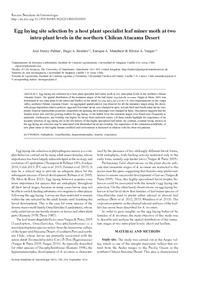Egg laying site selection by a host plant specialist leaf miner moth at two intra-plant levels in the northern Chilean Atacama Desert
Autor
Storey-Palma, José
Benítez, Hugo A.
Mundaca-Ortega, Enrique
Vargas, Héctor A.
Fecha
2014Resumen
Egg laying site selection by a host plant specialist leaf miner moth at two intra-plant levels in the northern Chilean
Atacama Desert. The spatial distribution of the immature stages of the leaf miner Angelabella tecomae Vargas & Parra, 2005 was determined at two intra-plant levels (shoot and leaflet) on the shrub Tecoma fulva fulva (Cav.) D. Don (Bignoniaceae) in the Azapa valley, northern Chilean Atacama Desert. An aggregated spatial pattern was detected for all the immature stages along the shoot, with an age dependent relative position: eggs and first instar larvae were clumped at apex; second, third and fourth instar larvae were mostly found at intermediate positions; meanwhile the spinning larva and pupa were clumped at basis. This pattern suggests that the females select new, actively growing leaflets for egg laying. At the leaflet level, the immature stages were found more frequently at underside. Furthermore, survivorship was higher for larvae from underside mines. All these results highlight the importance of an accurate selection of egg laying site in the life history of this highly specialized leaf miner. By contrast, eventual wrong choices in the egg laying site selection may be associated with diminished larval survivorship. The importance of the continuous availability of new plant tissue in this highly human modified arid environment is discussed in relation with the observed patterns.
Fuente
Revista Brasileira de Entomologia, 58(3), 280-284Identificador DOI
dx.doi.org/10.1590/S0085-56262014000300009Colecciones
La publicación tiene asociados los siguientes ficheros de licencia:


